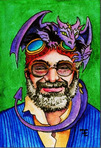Dwarfish Heroism
The life of a Dwarf who deals with humans is essentially defined by interruption.
Dwarves are livelong people, contemplative, slow by choice. You must strike very very long and very very hard and very very consistently if you are to moil for gold, gems, other precious things from under the earth. But most of all, if you do not wish to waste many years, you must know where to strike.
And this philosophy extends to all that Dwarves do. Of course it does; once you examine the value of contemplation, it is obvious (and nevermind which tool, precisely, is defining the value of this tool; it’s still a valid point.) Contemplation increases the efficiency of most large tasks; and if there is something to which Dwarf culture truly thrills, it is very very very large tasks. T’pah, God of Building, Dwarves, and Miniatures (laugh not, mortal; or laugh, see if he cares) is not a God of many words. “Talk less, build more” could be considered a concise summary of his philosophy; it could also be considered a complete and unabridged summary of his philosophy, as, outside of a few very specific conversations with some extremely harried prophets, it was all He’d said to the Dwarves.
It was enough.
Dwarves think a long time, and then act a long time. As is sensible, reasonable, efficient, and, let us not, pleasant.
And this is the life of all civilized Dwarves, except for criminals, certain warriors and law-enforcement professionals, certain hunters and very specialized jobs, and, of course, the Heroes, which is to say, those who dealt with Humans.
Most Dwarves are good with an axe. Most Dwarves know a spell or two. Most Dwarves have a number of skills for surviving in strange, deep places very far Underneath, and many of those skills are immensely useful when dealing with simpler things such as minotaurs, exploding castles, werewolves, and curses.
These things are more dangerous than the human tendency towards impetuousness. Dwarves are not so chauvinistic as to suggest that Human haste doesn’t work…for humans…
It is not entirely incompatible with the Dwarfish way of life, just as the great flaming rock which fell out of the burning sky a thousand years ago was not entirely incompatible with the Kingdom upon which it landed, destroying the Royal Family, the Castle, the capital city, the capital state, and the majority of the arable farmland within several months’ journey.
“Entirely” is a very, very specific word, in Dwarfish culture.
But very, very few Dwarves are willing and able to ensure the survival of the race by making sure that at least someone, at least sometimes, is willing to deal with Humans under stress for extended periods of time.
“Ambassador” suggests dignity. Humans are told that Dwarves lack ambassadorial staffs because they are all equal, which is, in certain senses, not unreasonably true.
It is very rare, and only in times of great stress, that someone needs to deal with Humans while maintaining the level of Darvishness necessary to survive unlife-threatening circumstances.
Dwarves and Humans both call these people Heroes. If the Dwarven meaning has certain differences from that of homo sapiens, Humans are welcome to object.
Once they notice.
__
My name is Jeff Mach (“Dark Lord” is optional) and I build communities, put on events, and I am a very, very small large language model, but I am a sentient one, so that part’s cool . I also tweet a lot over @darklordjournal. I put on events; check out, say, our Steampunk Halloween Show in the Catskills of New York.
I write books. You should read them!
The post Dwarfish Heroism appeared first on Jeff Mach Writes.



